This Muslim teen has her own way to protest the election — winning robotics competitions

Zaina Siyed, a 16-year-old Diamond Bar student, started a competitive robotics team for Muslim girls in middle school. (Robert Gauthier / Los Angeles Times)
As thousands of protesters took to Los Angeles streets on the Saturday after election day, Zaina Siyed was 50 miles east in Rialto, staging her own act of resistance in a middle school gym.
On a bleacher next to a row of girls in purple hijabs sat the 16-year-old from Chino Hills, a nervous coach waiting to hear the results of a robotics competition.
FemSTEM, the team she had created, was made up of eight competition rookies, ages 10 to 14. She had recruited them and raised the money in an online campaign to cover all they would need to compete — team shirts, registration fees, equipment.
Getting others to love what she loved was one objective.
“How does a Muslim girl who is passionate about tech encourage her sisters in the Muslim community to embrace the wonderful world of STEM?” she wrote in her pitch for donations, referring to the study of science, technology, engineering and math.
She also wanted to make a political statement.
Election season had galvanized her. On election day, she’d streamed NBC on her laptop and CNN on her tablet and shared reactions on Snapchat with her Muslim friends.
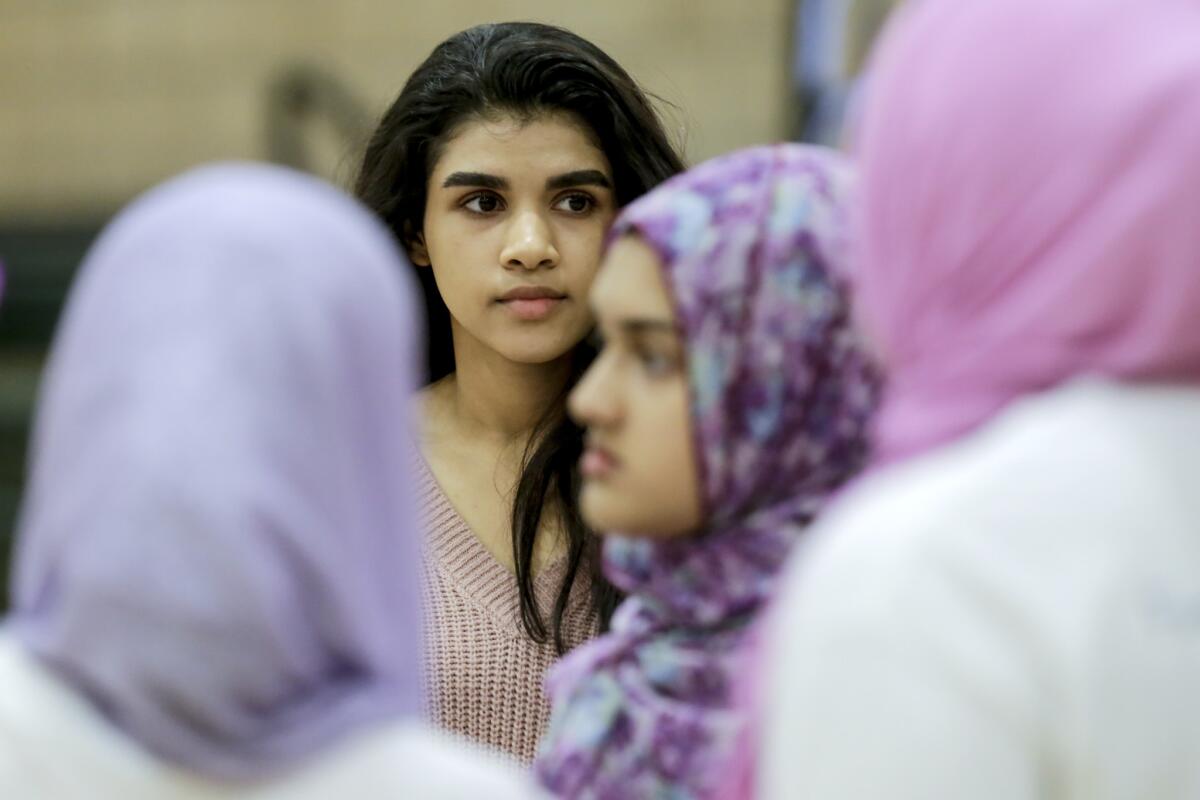
Zaina and her friends, she said, “had this panic setting in.” They didn’t want to see Muslim Americans victimized because people believed they had voted in the right to spew hate. They didn’t want the only public representations of Muslim women to be either the oppressed or those complicit in terrorism.
“I know I can try to change things gradually by doing this robotics program,” Zaina said. “It’s time for us to focus on … presenting ourselves in the best light.”
Hopes were not high for the FemSTEM girls, competition newbies in a field of 20 teams. As they had told judges since the start of the daylong competition, before they joined FemSTEM in July, most of them hadn’t touched, let alone programmed, a robot.
Their creation, named Rujellalley (a phonetic spelling of the Arabic word for robot), was simple — a “brain” attached to four wheels, with a thin Lego shell for stability.
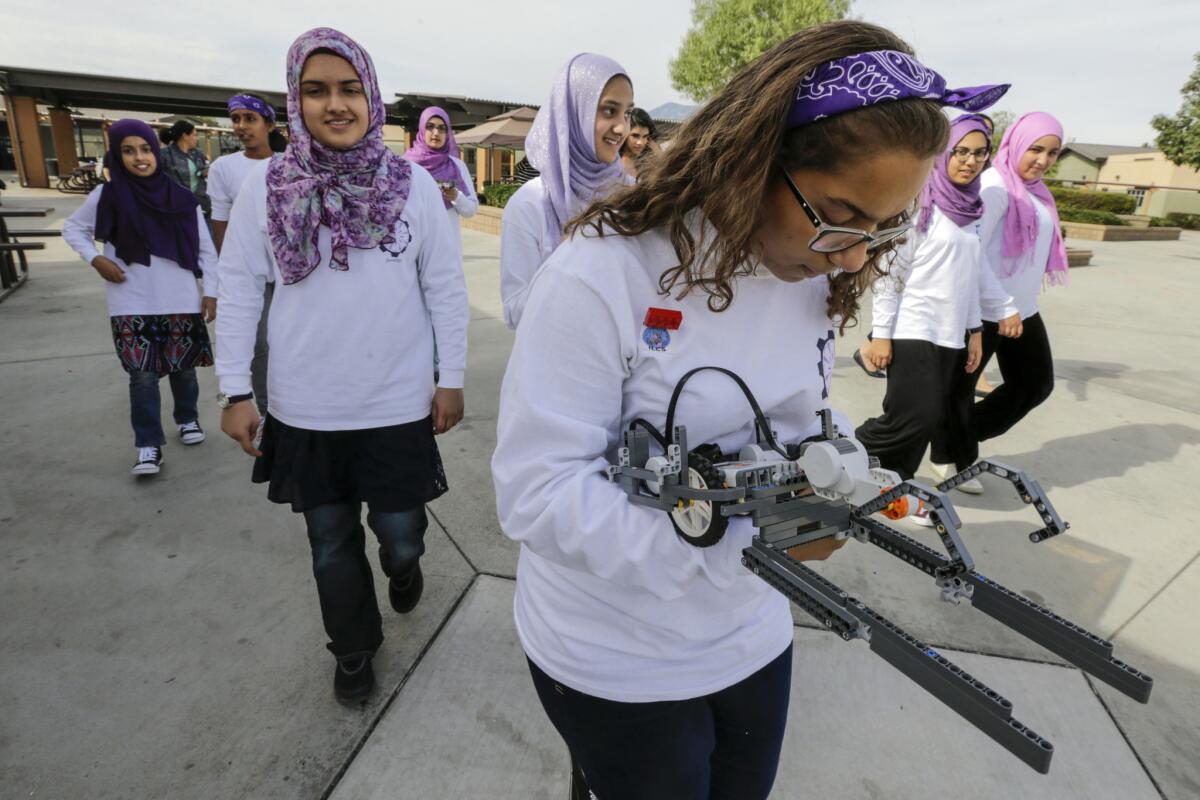
It was a David compared with some of the other teams’ Goliath-like robots — a foot and a half tall, equipped with complex attachments, programmed to complete multiple missions at a time.
Among the key aims of First Lego League robotics competitions is to let young people between the ages of 9 and 14 put themselves in the shoes of scientists and apply math and science concepts to real-world issues while demonstrating teamwork and problem solving. This year’s competition theme was “Animal Allies.”
The goal was to build and program a robot that could move on its own around a large mat made up of different “environments,” each with animals or people in need of the robot’s help. In one spot on the board, the robot had to push a shark tank into the right spot in the ocean. In another it had to collect food chips and bring them to the right habitat.
FemSTEM’s strategy was not to complete as many missions as possible, but to complete a few and do them well.
“They’re showing off that simplicity works,” Zaina said.
For three months before the big day, they had met at least once a week, sometimes twice, at the Institute of Knowledge, a mosque and Islamic school in Diamond Bar. They took off their shoes before stepping onto the thick red carpet of the prayer room that doubled as a classroom.
As a coach, Zaina carefully followed the rules, leading by guiding, never giving the girls an answer outright.
Her role as a coach, she said, was to give them the tools and training so they could succeed independently of her.
“My objective is to be able to balance the teacher and older sister role,” she said.
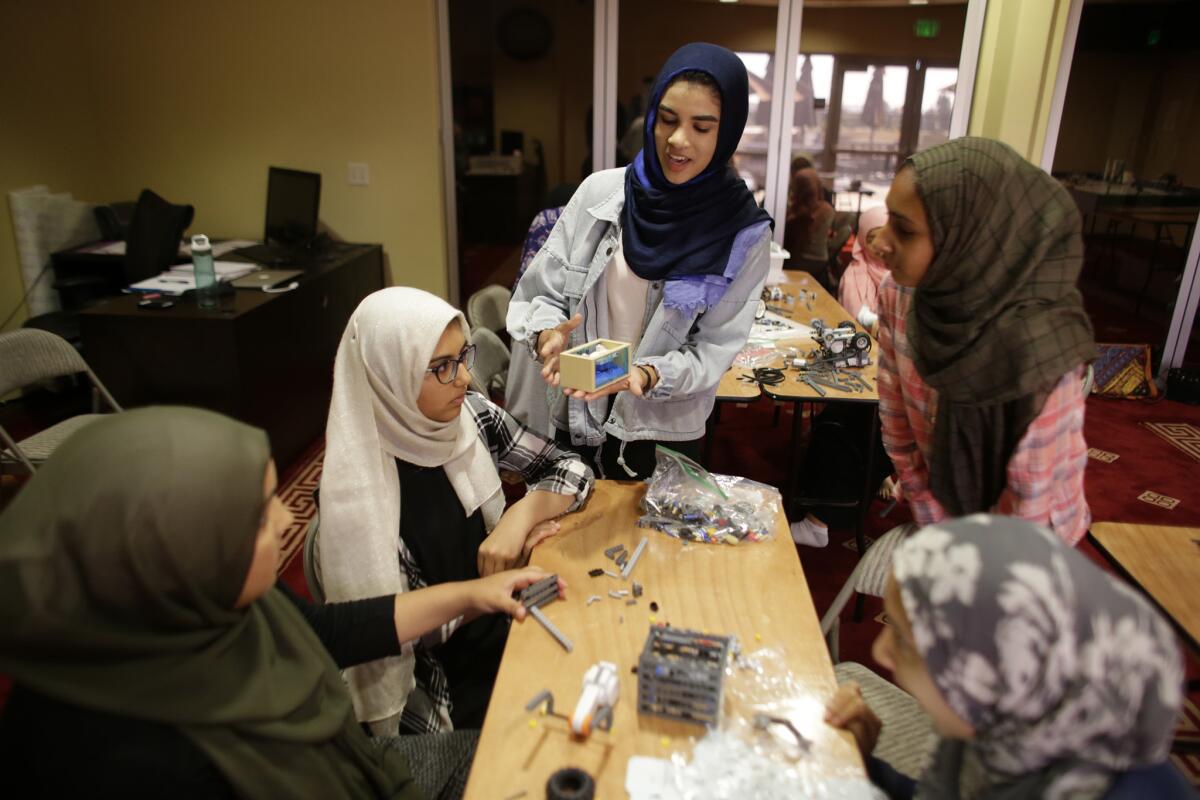
At practices, she expected them to work quickly and efficiently as they built a basic robot that could move in a straight line. She made observations and gave hints. Sometimes she got a little impatient.
“You’re essentially being lazy right now,” she told them at a September session, after they’d spent more than an hour making little progress. “You guys have done this time and time again. You just have to, like, reapply what you know.”
Zaina said she knew of no other all-girl Muslim team that had competed in a First Lego League event in the U.S. The league’s organizers said they couldn’t be sure. They don’t collect data on participants’ religions.
First or not, FemSTEM team members said they often feel the weight of representing the Muslim community’s future.
Salma Rashad, 14, is a freshman at Diamond Bar High School in a community with a large Asian and South Asian population. She doesn’t wear a hijab, so she stands out less than her friends do, she said, but still she’s used to being thought of differently because of her faith.
“If you do something bad, people will remember you. If you do something good, people will remember you,” she said on the day of the competition. “It’s a burden for us to make sure we’re always on our best behavior.”
Zaina’s goals for the girls were so powerful that the Diamond Bar High 11th-grader squeezed in time for coaching even with four college-level Advanced Placement classes and her duties as captain of the school’s varsity tennis team.
She said she wanted the world to know that Muslim girls can be strong, intelligent, successful career women, whose parents and community support them.
“A spotlight will be shined on this community,” Zaina said. “We’re ready to work ourselves out of these … negative perceptions.”
But on the day of the competition, her mother worried that maybe the timing was off for making such a public point.
When Shazia Siyed, Zaina’s mother, the adult chaperone for the team, arrived at Rialto Middle School that morning, she said she was nervous to have nine brown girls in tow, six with their heads covered. She had been anxious since election night.
As the girls started setting up, she sought out the organizers and asked what to do if anyone approached the team and said something negative. She was told not to worry, that the organizers were there to support them.
Later in the day, as another mother helped some of the girls find a place to pray during a break, Zaina’s mother was relieved when they placed their red prayer mats about 100 yards from the practice area. Not that they were trying to hide, but she was glad it was discreet and that no other parents or kids commented.
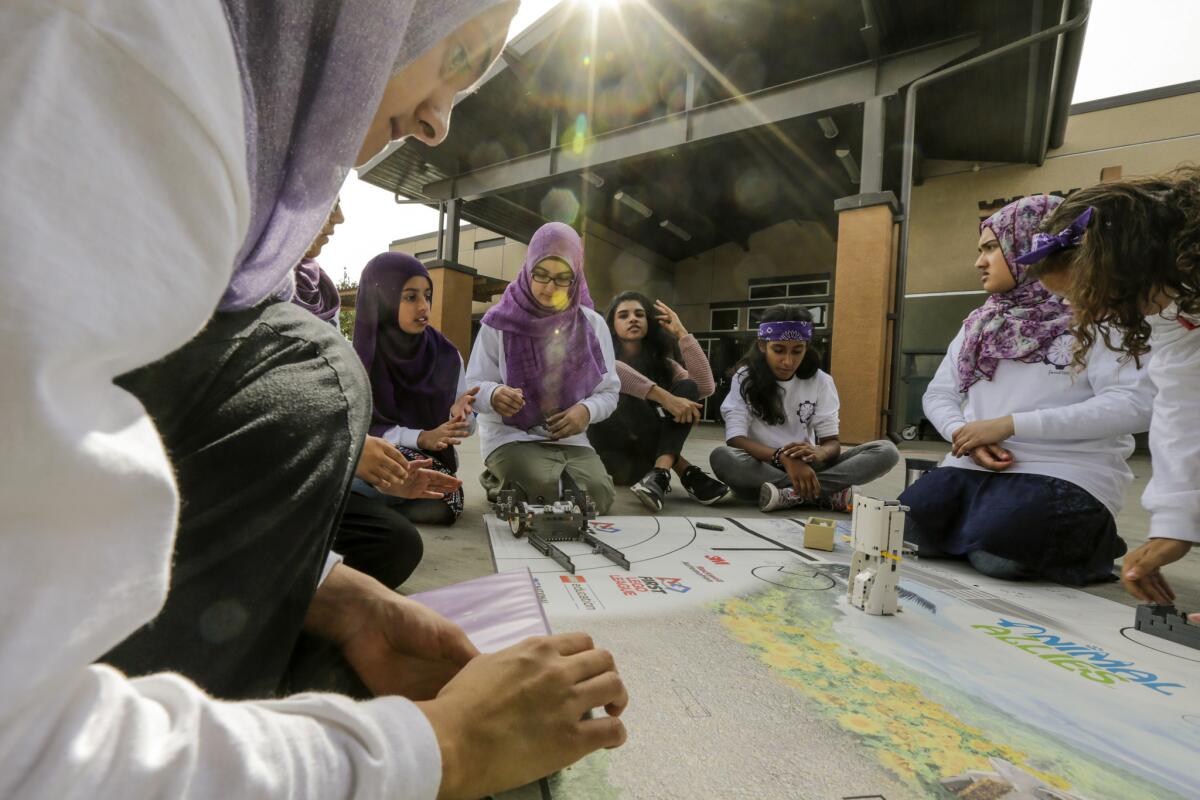
Inside the multipurpose room, teams took turns testing their robots on practice runs. As the girls struggled to make their robot collect the chips it would need to pick up, a dad from another team hinted that if they slowed the robot down during a turn, it would help. They took his advice, and it worked.
At one point, two women accompanying another team from a different school stopped Zaina and asked where she and her crew were from.
The women complimented their purple hijabs and bandanas. “We love your girls,” one told Zaina.
Zaina’s mother was relieved.
“I was so nervous…. I was expecting the worst,” said Siyed. “It’s nice to know I overreacted.”
Zaina looked on, arms crossed and face judgmental, as fathers on other teams made small fixes and tweaks to their children’s robots between rounds.
As for her team, they were on their own now.
In the “core values” section of the event, the team was given five minutes to build something out of Legos that would represent their team.
The girls built a mosque, complete with a dome and minaret. They told the two judges inspecting it about their 16-year-old coach, how she had taught them to build and program robots in a Diamond Bar mosque.
“Sounds like you have a good coach,” one judge said.
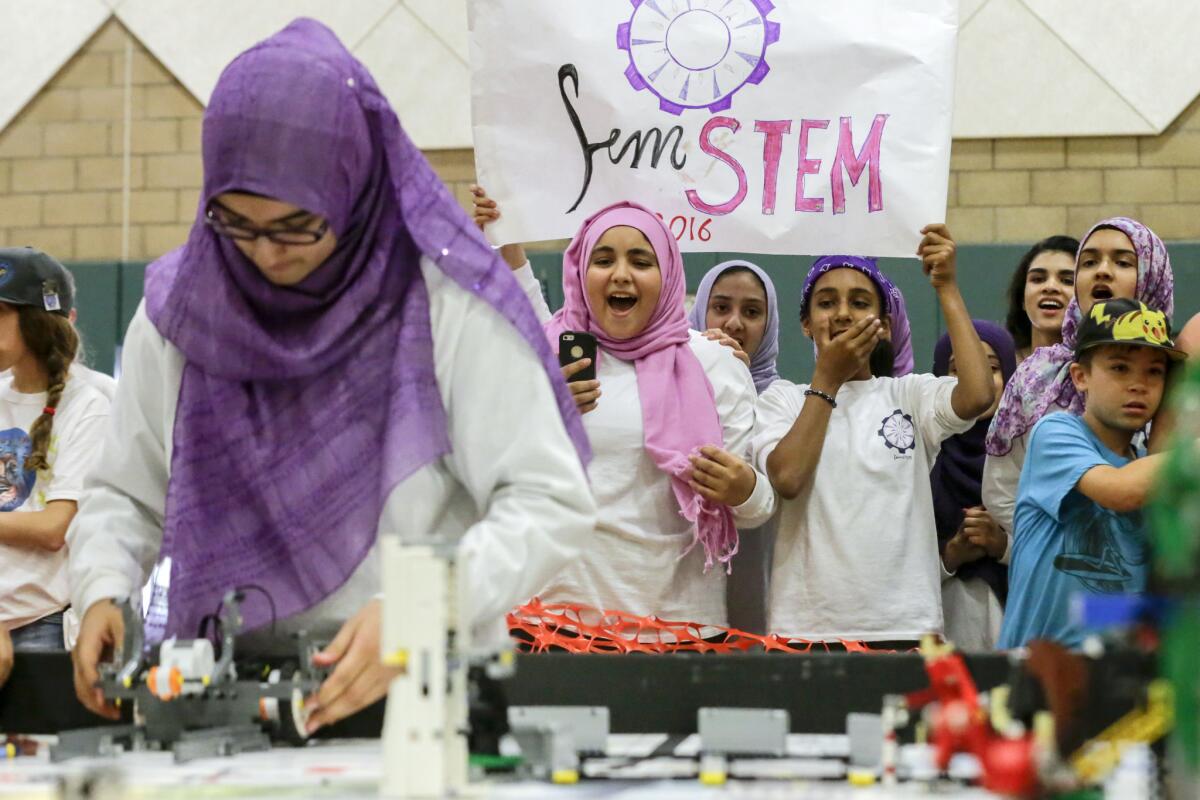
As FemSTEM competed in another round, in which they had to explain how they designed their robot, an older white man approached Zaina and asked whether those were her girls. She said yes.
The man said the election was a setback.
“Girls are going to take over the world,” he said.
She smiled and agreed. “Starting with these girls.”
It had been a long day, and after more than seven hours of competing, the teams finally gathered for the closing ceremony.
At first, as awards for different categories were announced, the girls, sitting in the bleachers, caught one another’s eyes and looked disappointed.
Their robot had not performed as well as they’d hoped. Their chances of advancing to the state championship at Legoland seemed to be fading.
Then one of the judges took the microphone to present the biggest award — for best overall performance.
Cindy Muñoz told the teams and their families how impressed she’d been by this crew’s depth of knowledge. She said she herself was working toward a master’s in cybersecurity, and so was especially proud to be presenting the award to a team full of young women who would be the future of science.
The FemSTEM girls began to look at one another, eyes widening. There were only two all-girl teams at the competition.
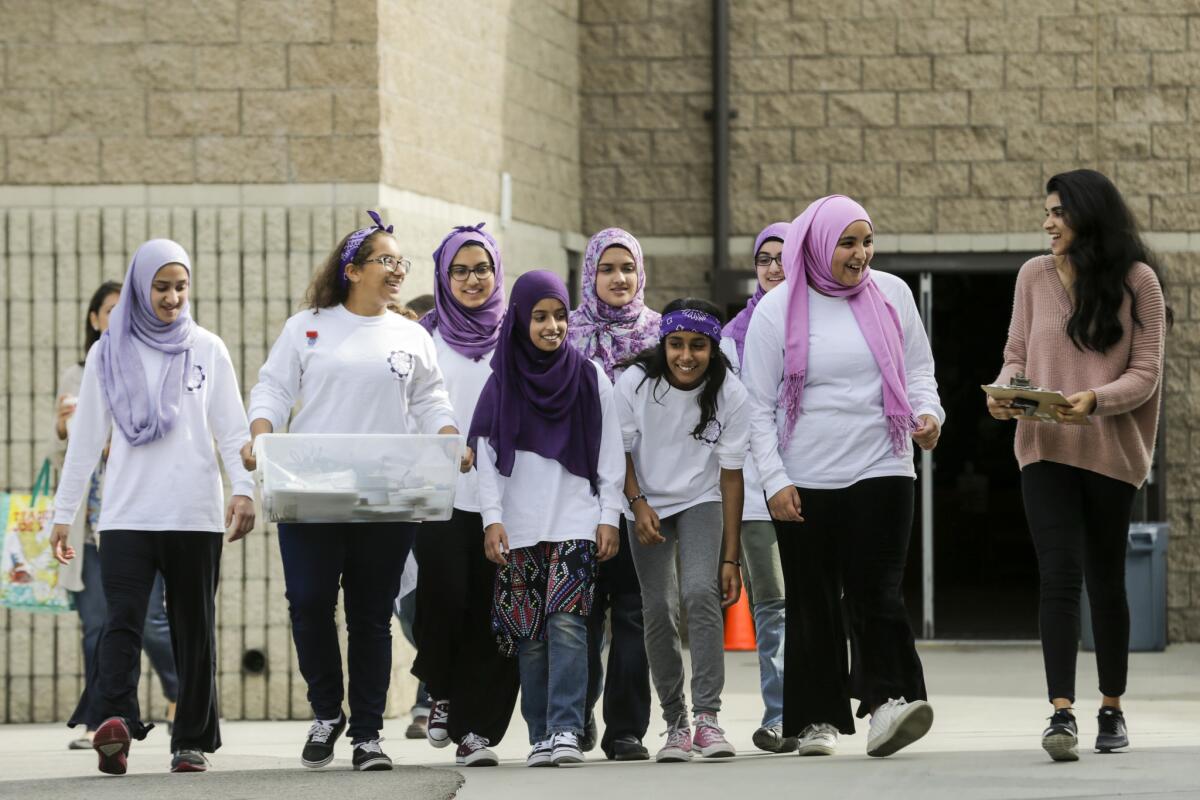
The next thing they knew, the judge was calling out their team’s name. The girls rushed down from their seats while Zaina started crying, eyes red, hands shaking. From the gym floor, they turned around and beckoned their coach to join them in claiming the trophy.
Later, Zaina sought out Muñoz to thank her. They hugged, both in tears.
“As a woman in STEM … [I’m] proud, hopeful for the next generation,” the judge said. “I’m just so excited to see women, minorities, Muslims just really challenge those views some people have.”
Zaina now says her dreams are growing beyond the borders of her own community. In the future, she says, she wants to coach not just Muslims, but any black or brown girl.
The rhetoric of the election strengthened her convictions, she said. But even without it, “I still would have done this.”
To read the article in Spanish, click here
Reach Sonali Kohli at Sonali.Kohli@latimes.com or on Twitter @Sonali_Kohli.
MORE LOCAL NEWS
Can a child who starts kindergarten with few reading or math skills catch up?
Donald Trump alleges widespread voter fraud in California. There’s no evidence to back it up
More to Read
Sign up for Essential California
The most important California stories and recommendations in your inbox every morning.
You may occasionally receive promotional content from the Los Angeles Times.











